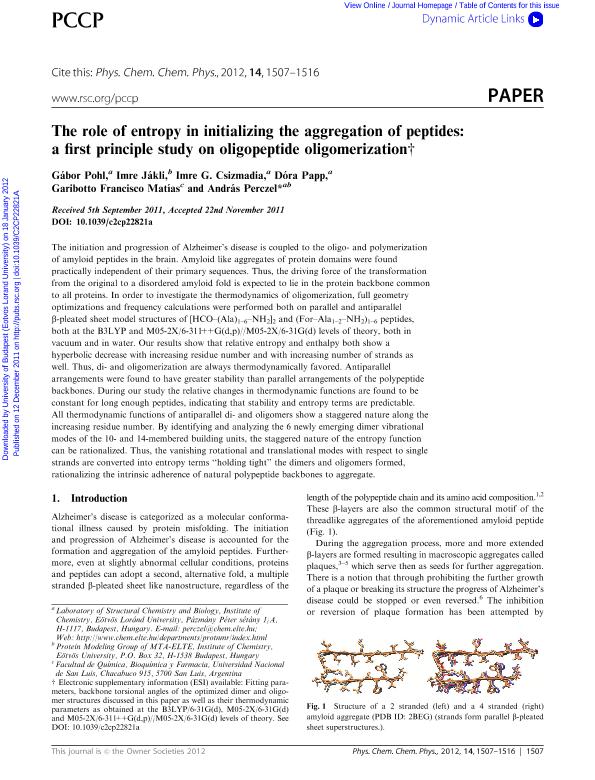Artículo
The role of entropy in initializing the aggregation of peptides: a first principle study on oligopeptide oligomerization
Pohl, Gábor; Jákli, Imre; Csizmadia, Imre G.; Papp, Dóra; Garibotto, Francisco Matías ; Perczel, András
; Perczel, András
 ; Perczel, András
; Perczel, András
Fecha de publicación:
28/01/2012
Editorial:
Royal Society of Chemistry
Revista:
Physical Chemistry Chemical Physics
ISSN:
1463-9076
Idioma:
Inglés
Tipo de recurso:
Artículo publicado
Clasificación temática:
Resumen
The initiation and progression of Alzheimer's disease is coupled to the oligo- and polymerization of amyloid peptides in the brain. Amyloid like aggregates of protein domains were found practically independent of their primary sequences. Thus, the driving force of the transformation from the original to a disordered amyloid fold is expected to lie in the protein backbone common to all proteins. In order to investigate the thermodynamics of oligomerization, full geometry optimizations and frequency calculations were performed both on parallel and antiparallel β-pleated sheet model structures of [HCO–(Ala)1–6–NH2]2 and (For–Ala1–2–NH2)1–6peptides, both at the B3LYP and M05-2X/6-311++G(d,p)//M05-2X/6-31G(d) levels of theory, both in vacuum and in water. Our results show that relative entropy and enthalpy both show a hyperbolic decrease with increasing residue number and with increasing number of strands as well. Thus, di- and oligomerization are always thermodynamically favored. Antiparallel arrangements were found to have greater stability than parallel arrangements of the polypeptide backbones. During our study the relative changes in thermodynamic functions are found to be constant for long enough peptides, indicating that stability and entropy terms are predictable. All thermodynamic functions of antiparallel di- and oligomers show a staggered nature along the increasing residue number. By identifying and analyzing the 6 newly emerging dimer vibrational modes of the 10- and 14-membered building units, the staggered nature of the entropy function can be rationalized. Thus, the vanishing rotational and translational modes with respect to single strands are converted into entropy terms “holding tight” the dimers and oligomers formed, rationalizing the intrinsic adherence of natural polypeptide backbones to aggregate.
Palabras clave:
Alzheimers Disease
,
Polymerization of Amyloid Peptides
Archivos asociados
Licencia
Identificadores
Colecciones
Articulos(IMIBIO-SL)
Articulos de INST. MULTIDICIPLINARIO DE INV. BIO. DE SAN LUIS
Articulos de INST. MULTIDICIPLINARIO DE INV. BIO. DE SAN LUIS
Citación
Pohl, Gábor; Jákli, Imre; Csizmadia, Imre G.; Papp, Dóra; Garibotto, Francisco Matías; et al.; The role of entropy in initializing the aggregation of peptides: a first principle study on oligopeptide oligomerization; Royal Society of Chemistry; Physical Chemistry Chemical Physics; 14; 4; 28-1-2012; 1507-1516
Compartir
Altmétricas



